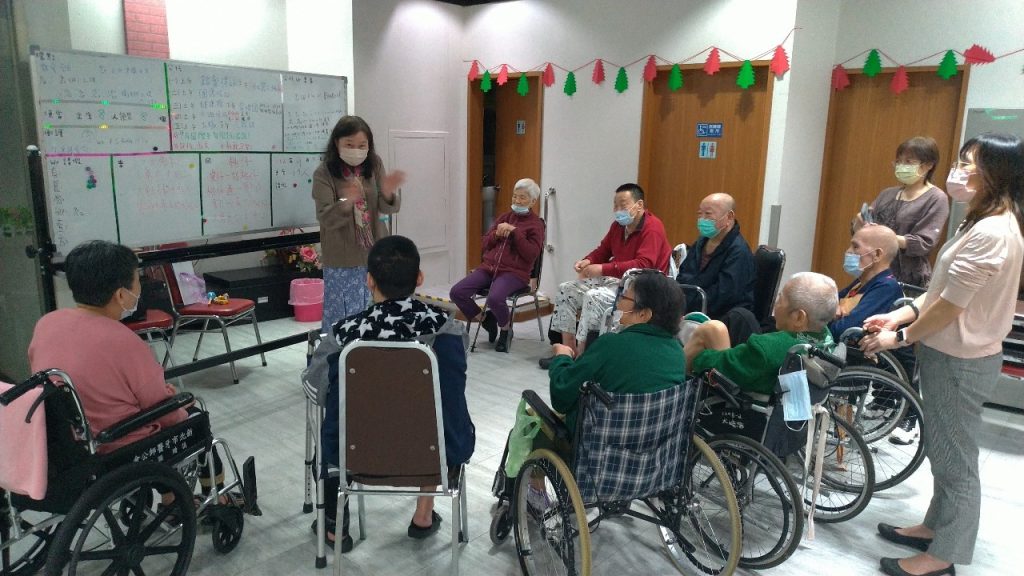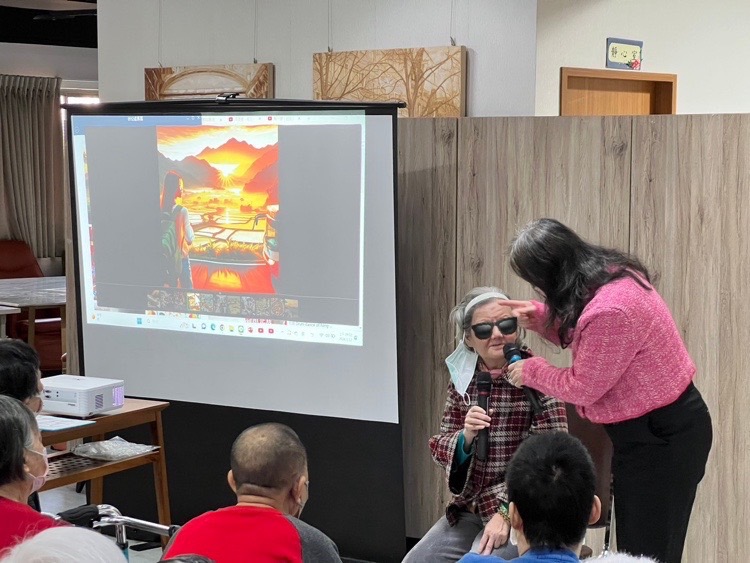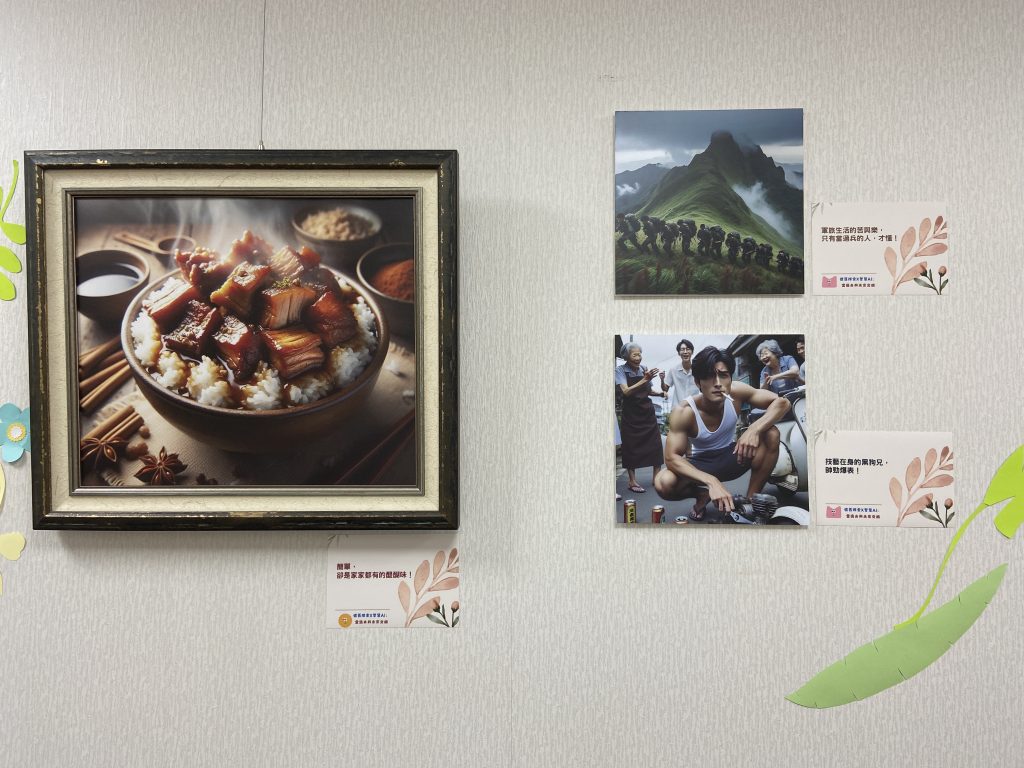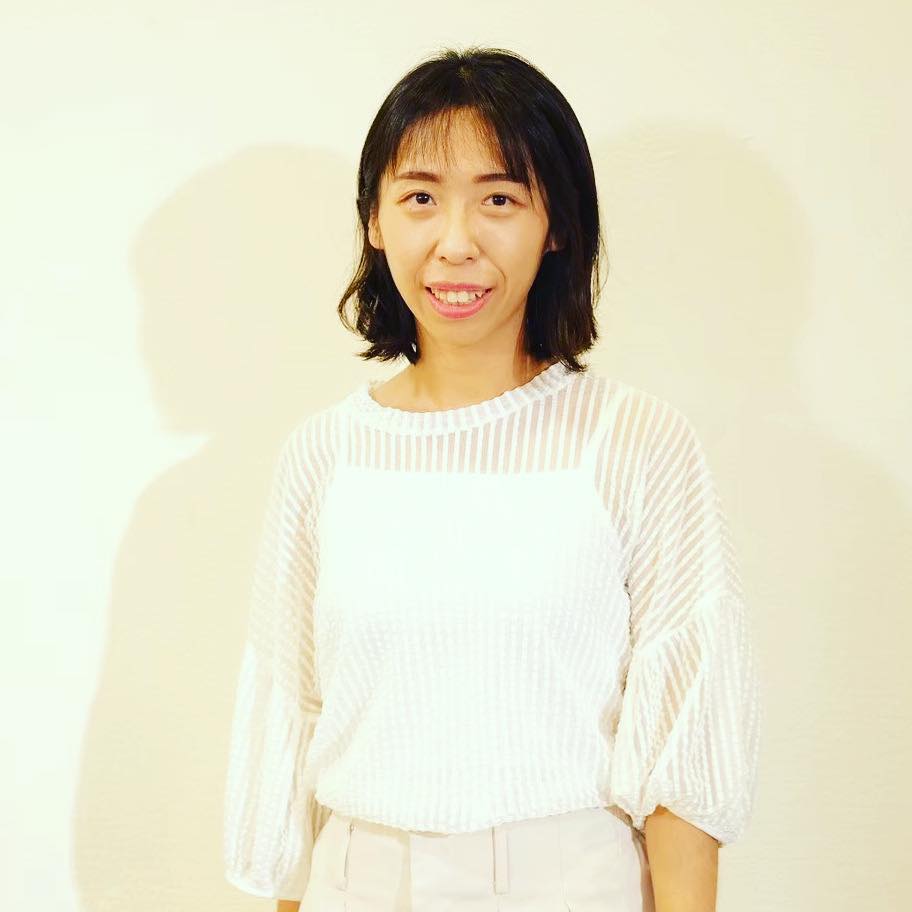This guest blog post has been written by Sih-Ying Hsieh (Iris Hsieh) who is an artist, a community practitioner and a PhD Researcher specialising in socially engaged art and art practices in relation to dementia. More author information can be found at the end of the post. The blog has been uploaded and edited by Emma Putland on behalf of the Public Discourses of Dementia Project team.
As Taiwan faces a rapidly ageing population, with 20% of citizens expected to be over 65 years old by 2025, non-pharmacological treatments and social prescribing services are increasingly vital in community healthcare programmes (Ministry of Health and Welfare, 2019; Ministry of Education, n.d.). Though dementia prevention research has included social factors and evaluates non-pharmacological interventions, the applications in mental healthcare seem to be under explored (Newby et. al, 2023). This blog post presents a case study of the Time Machine: AI Art and Reminiscence Therapeutic programme (hereafter referred to as the Time Machine Project), co-led by Art For All and Excelsior Care Homes based in Taiwan. The project aims to evaluate the accessibility of art sessions as a potential regular programme in day care centres. It explores how people participating in the Time Machine Project with mild symptoms of dementia are encouraged to share lived experiences, generate memorable scenes and connect with their families through the guidance of art-health practitioners to support their mental health.
The Time Machine Project: An Art Education Programme
Drawing on the artistic expression of people with dementia, the Time Machine Programme research team, collaborating with social workers, art educators and care professionals, explores how art educators can help recall the memories of people with dementia through performative art methods during workshops. People living with dementia might experience cognitive degradation related to memories, and can also experience depression, low self-esteem and anxiety. As such, we are curious about how educators can improve the quality of mental healthcare for people living with dementia. Our research starts by asking: when individuals with dementia experience memory loss or struggle to speak, can art serve as a medium to help them communicate with the world and those around them? To answer these questions, we aim to connect art education and cognitive diseases, primarily dementia care in the Time Machine Project.
Art and Health
Art-Health Practice in Community Programme
We believe that, in line with healthcare guidance for senior citizens, the performative art sessions can help participants stay connected with their families and remain physically active. Specifically, our project aligns with ‘health improvement initiatives’, which is one of the ageing wellbeing principles of Taiwan’s government, whereby older adults are encouraged to attend various socialising activities to support healthy ageing. Within this, people living with dementia can access diverse activities to help maintain cognitive health and overall wellbeing (National Institute on Aging, n.d.). The principle of holistic care is embedded both throughout this project and in the care centres to develop the programme.
Our recruitment of participants began in care homes to assess how the programme fit the care needs of people with dementia. We received a request from a day care centre and care home based in New Taipei City (Taiwan), in which we were informed that 18 elders who had been diagnosed with dementia, were reliant on wheelchairs and had multiple chronic conditions were eager to experience creative social activities. Art proved to be an attractive medium for these older people. For instance, when educators invited participants to share their happy memories with their families, they sang old songs together and confidently recounted childhood memories. The workshop experience demonstrated that music and reminiscence activities attracted more attention from participants and, following positive feedback about these workshops, we crafted a programme to investigate how art-based methods can be effective in care practices.
How Do Art-based Methods Support Dementia Care Practices?
Arts-based and creative approaches to dementia care offer a successful alternative to medications (McGreevy, 2016). In Taiwan, the concept of creative ageing has flourished in the accessibility and equality strategies of museums.The first creative ageing programme in 2016 focused on art and creative activities for the elderly and scaled up in the following years (Chou, 2024). As a result, arts are considered valuable creative approaches in supporting care practices, such as painting, photography, writing, craft, and music.
In our programme, researchers employed various methods that allowed them to interpret, collect and share new knowledge of dementia care. For instance, educators can understand the different emotions of people with dementia by viewing participants’ graffiti, especially for someone who cannot speak fluently (National Taipei University, 2023). In essence, while people’s reactions to artworks can vary, this approach opens up new avenues and opportunities that can be used to better support people living with dementia and their families.
The Benefits of Art-based Methods
Art-health workshops are common to employ in the care centres communities because it is easy and inclusive for people experiencing dementia to have the chance to access group conversations. Participants can reach the art materials easily, exchange their thoughts promptly and experience a safe space to share their feelings (McGreevy, 2016). Since people with middle-stage dementia might not be fluent in verbal communication, art-based methods offer an inclusive space to open and reconnect conversations with their families and friends, and can support confidence, autonomy, connection, and achievement (Hsieh & Liao, 2023).
Overcoming Challenges in Implementation
However, the use of art-based methods faces challenges such as safety concerns and medical regulations that hinder the implementation of these services in care homes, notably since art has yet to be legally recognised as a treatment in Taiwan’s healthcare system (Focus Taiwan, 2023). Therefore, art-health workshops between art educators and community workers are in the piloting stage, indicating potential for further study in art education research related to dementia.
Building on these art-based approaches, our project explored how cutting-edge AI technology could further enhance memory recall and creative expression in dementia care.
The Time Machine Project
How Do Generative AI Tools Recall Memories from Childhood?
To craft inclusive and creative care programmes for people living with dementia participating in the Time Machine Project, we introduced a generative AI image generator into community education modules. This digital application was introduced by us for the care home staff, who hoped to enhance cognitive functions and social contacts for their residents living with dementia during workshop participation.
Given that generative AI is a deep learning mechanism, it is known for generating texts, images, or audio speeches through diverse data and prompts (Shokrollahi et al., 2023), making it easier for participants to navigate their past memories according to specifically generated images during the workshops. The research team trained art educators to incorporate these generative AI tools in their practice, with one trained educator mentioning:
‘I was gradually becoming more familiar with the operation of the AI generator and then applied its use in my teaching practice. It was amazing that the AI programme taught additional prompts from trained educators to improve its accuracy generating images details. As such continuous learning, the AI and I both learn from each other. It was so much fun, wasn’t it?’
Art educator who participated in the AI training
We can see that AI tools can help empower educators to stimulate new ideas with AI to improve their teaching skills. For example, during the practice of reminiscence therapeutic workshops, when participants lacked photos or struggled to recall details of traditional Dragon Boat Festival in Taiwan, they could follow the clues in the various AI pictures of boat racing or traditional meals to join the group conversation. Under the supervision of educators, participants were more likely to share past life events and (re)visit memories (Hsieh et al., 2024). As a result, the educators and participants could navigate their imagination through diverse and creative generated images to communicate with each other and enjoy their storytelling time together.

Stimulating Conversations and Memories
Our research indicates that older people with dementia enjoyed storytelling with AI-generated pictures during their activities. Interestingly, when memory images were discussed during workshops, people living with dementia were more willing to express their feelings and happy to talk about their life stories with other residents in the care home. The storytelling from these AI-generated images evoked many memories in participants’ minds, and then the story weaving began. Here are some ideas that emerged from reminiscence activities:

‘I remembered working with my dad in the rice fields when I was little. When the sun set, I rode backwards to the back of the water buffalo and could see the sky’s fascinating orange and pink colour. I knew that I was done for today. It was my daily routine and invaluable time spent with my dad.’
‘When I was sixteen, I went northward to do my first job. It was an early morning. My parents were sleeping. I sneaked out of my house and waited for the coach to Taipei at the bus stop. Suddenly, I saw the sun rise slowly from the bottom of the valley. I will always remember this scene. I said this in my mind.’


‘A long time ago, the dragon boat race regularly took place in Sanxia town at the dragon boat festival every year. My husband was enthusiastic about rowing the boat and practised so hard. On the day of the competition, my family and I looked out from the window to support his team. I was cooking in the kitchen and cheered with the crowd simultaneously, so I held my slotted turner. Suddenly, it dropped from my hand and into my neighbour’s house. It’s funny and embarrassing. I was too excited to drop it. Seriously, I am just a big fan of my husband.’
While these vivid scenes came to participants’ minds and were displayed with AI-generated images, our research team was surprised by the elicitation procedure. It was incredible for us to hear participants’ life story-telling inspired by AI-generated images because some participants were shy and used to be quiet in the very beginning.Through participatory observation, we found that the procedure of recalling memories helps people with dementia progress from story sharing and image generation to having representations of their lived experiences with pictures. Through the application of generative AI, we can glimpse into memorable scenes without old photos and keep conversations flowing among people living with dementia by using AI-generated images to visualise these memories. As a result, we believe that AI image generators can be a useful stimulator for verbal expressions, emotions, attitudes, and body language for participants during reminiscence workshops.
The Impact of AI-Assisted Reminiscence Therapy
At the end of the workshops series, participants gave positive feedback to educators and enjoyed story-weaving with their peers. For instance, some participants said they were happy to share their AI photos and tell a story on the stage in front of their family and friends, as encouraged by the educator. They were confident about presenting their AI works when they held a microphone, despite shy faces. Others might have been nervous but still moved forward a few steps to share their feelings. Overall, the staff, caregivers and families were surprised by the increased laughter and positive interactions.

At the final stage of the programme, we organised a show time for all the participants. The storytelling images were displayed on the wall in the community centre for the public viewing, and people with dementia, the other care home residents, and their families were invited to visit the exhibition. Participants were encouraged to give guidance for their stories where childhood scenes recalled life events, career experiences or traditional cultures. The audience left comments and stickers on each AI artwork to offer direct feedback on their visits. These interactive approaches were designed to enhance community engagements for local people. The exhibition curation created a stage for people with dementia to be seen and built a platform for bringing people together, exchanging opinions and collaborating.
The success of this approach in our Time Machine Project points to broader possibilities for AI applications in reminiscence therapy and dementia care.

Forseeing the Power of Creativity in Supporting Mental Well-being
This study offers a new perspective on generative AI applications for enhancing the mental well-being of people with dementia. The Time Machine Programme approach enables people with dementia to stimulate memories and provides a unique platform for self-expression and social interaction. In the near future, social workers and healthcare professionals can further investigate and embrace more creative methods in care work to better support the emotional and psychological needs of people living with dementia.
The case study of the Time Machine project highlights the potential of such innovative methods in care settings. By bridging the gap between art and healthcare, generative AI is paving the way for new cognitive and emotional support, helping participants reconnect with their past and share their stories with loved ones. However, using AI and virtual images in such settings presents challenges. While these images can evoke powerful emotions, they may also trigger trauma, underscoring the need for careful consideration of content and context, which should be guided by group discussions and consensus.
As creative care practices evolve in health promotion programmes, this project may serve as a model for similar initiatives, emphasising the value of creative expression in dementia care and the importance of a thoughtful, person-centred approach.
Footnotes:
- Art For All is a Taiwan-based NGO Art For All that focuses on social prescribing, art therapy, and health literacy for the elderly with dementia. It was founded in 2020. Their approach involves developing AI-generative images and chatbots embedded in community services to promote the health of older adults. Official Website: https://www.art-for-all.tw/
- Excelsior Care Homes belongs to Excelsior Healthcare Group, one of the leading suppliers of dialysis and surgical products from various brands. Their business channels cover product research, development, marketing and care systems. They also run care homes, day care centres, and nursing homes in cities around Taiwan.
References:
Chou, K. (2024). The age of creative ageing. The development and changing of creative ageing in Taiwan.(pp. 82-93). Taipei: Gathering Art.
Flatt J. D., Liptak A., Oakley M. A., Gogan J., Varner T., Lingler J. H. (2015). Subjective experiences of an art museum engagement activity for persons with early-stage Alzheimer’s disease and their family caregivers. American Journal of Alzheimer’s Disease and Other Dementias, 30, 380–389.
Focus Taiwan (2023). AFA team applies AI drawing technology in lifelong learning workshops: ‘giving new life to the memories of the older residents close to Bopiliao Historic Block’. https://www.cna.com.tw/postwrite/chi/345056
Gross S. M., Danilova D., Vandehey M., George M. Diekhoff. (2013). Creativity and dementia: Does artistic activity affect well-being beyond the art class? Dementia, 1471301213488899, first published on May 22, 2013
Kameyama, M., & Umeda‐Kameyama, Y. (2024). Applications of artificial intelligence in dementia. Geriatrics & Gerontology International, 24, 25-30.
Ministry of Health and Welfare (2018). Ten-year Long-term Care Plan 2.0: Happy Taiwan! Long moves, Division of Long-term Care. https://www.mohw.gov.tw/cp-16-42872-1.html
Ministry of Health and Welfare (2024). prevention on cognitive degradation and boost on social connectedness project.https://www.hpa.gov.tw/Pages/List.aspx?nodeid=4706
McGreevy, J. (2016). Arts-based and creative approaches to dementia care. Nursing Older People, 28(1).
National Institute on Aging (n.d). Cognitive Health and Older Adults. https://www.nia.nih.gov/health/brain-health/cognitive-health-and-older-adults
National Taipei University (2023). Case of University Social Responsibility: Elderly Service in Excelsior Care Homes. https://medium.com/usrsocntpu/usr-%E5%81%95%E4%B8%89%E5%B3%BD%E4%BD%B3%E9%86%AB%E5%85%AC%E6%89%98%E8%BE%A6%E7%90%86%E9%AB%98%E9%BD%A1%E6%9C%8D%E5%8B%99%E6%88%90%E6%9E%9C%E7%99%BC%E8%A1%A8-28fd60d79734
Newby, D., Orgeta, V., Marshall, C. R., Lourida, I., Albertyn, C. P., Tamburin, S., … & Ranson, J. M. (2023). Artificial intelligence for dementia prevention. Alzheimer’s & Dementia, 19(12), 5952-5969.
Shokrollahi, Y., Yarmohammadtoosky, S., Nikahd, M. M., Dong, P., Li, X., & Gu, L. (2023). A comprehensive review of generative AI in healthcare. arXiv preprint arXiv:2310.00795.
Sih-Ying Hsieh, Mei-Huei Liao (2023). “Art as a Social Care: Aging Services from Perspective of Digital Art Prescribing”, Arts, Management, Artificial, Intelligence International Conference, 27 October, NewTaipei City, Taiwan
Sih-Ying Hsieh, Mei-Hui Liao, Min-Chen Wang (2024). “AI-generated images cultivate imagination of reminiscence therapy: Performative conversations for people living with dementia in Taiwan”. Dementia in Film, Media and Culture Symposium. 31 May 2024, Edinburgh, Scotland
Windle, G., Gregory, S., Howson-Griffiths, T., Newman, A., O’Brien, D., & Goulding, A. (2018). Exploring the theoretical foundations of visual art programmes for people living with dementia. Dementia, 17(6), 702-727.
About the author
Sih-Ying Hsieh (Iris Hsieh) – Artist and Community Practitioner
Sih-Ying Hsieh (Iris Hsieh) is currently a PhD Researcher in University of Glasgow, specialising in socially engaged art and art practices on dementia healthcare. She has served as a curator in the Taichung City Museum of Fine Arts in Taiwan and a policy maker in the Cultural Affairs Bureau of Taichung City Government. As an independent artist, she is known as a community practitioner caring for marginalised youth, the elderly living with dementia and carers devoted to creative care and sustainable communities.
